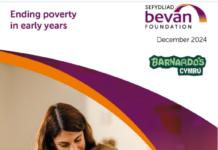HERE WE NO
New survey reveals parents in Wales will say no to their children
more than 7,700 times a year.
Parents in Wales say ‘no’ to their children 7,705 times a year – with more screen time, buying something when shopping and sweets before bed likely to get the negative response.
A survey of 2,000 adults, with children aged one to 16-years-old, revealed parents in Wales reject their kids’ questions and queries an average of 21 times a day – just below the UK average of 23 times.
70 per cent of parents have to repeatedly say no to their child for the same request, over and over again.
And when parents were asked why they say no too often, 40 per cent said was because they want them to understand they can’t get everything that they want. This was followed by 39 per cent who don’t want their kids to be spoilt, and 38 per cent said they did so to protect their kids.
The survey, commissioned by kids’ camp and family adventure holiday provider PGL to discover if parents telling their children no can stunt a child’s growth, reveals the most common things they are told no for includes more screen time (35 per cent), buying something every time the family go shopping (33 per cent) and sweets before bedtime (33 per cent).
However, it emerged parents will say yes more often than no, a total of around 8,016 times a year. The top reason given by parents for saying yes was because of guilt at working too much (35%).
But only 24 per cent of these parents said they opt to say yes to let their child feel in control of their own decisions.
And just 10 per cent of those surveyed have tried to raise their child in an environment where they are never told no, and always answered in the positive.
Parenting expert Anita Cleare, author of The Work/Parent Switch and Positive Parenting Project said: “It’s natural for parents to want to protect our children and smooth the obstacles in their paths. However, facing challenges and trying something new is really important for building children’s self-esteem and resilience.
“Children need opportunities to stretch themselves and take on challenges in safe and secure
environments. By letting children take on a challenging activity, we send them the signal that we believe in them – and that, yes, they can do it!”
Anthony Jones, CEO of PGL, which commissioned the research and offers Kids’ Adventure Holiday Camps for children aged eight to 16, as well as Family Adventure Holidays said: “It’s interesting to see modern parents say yes to their children more than no – as a parent I know how difficult it can be to keep repeating yourself when children make the same request on a loop.
“But giving children the scope to be themselves is important, and an independent holiday where they can grow their own self-belief, independence and confidence away from home can prove crucial in their development. PGL challenges parents to let their children have this independent adventure – and we often hear it’s the parents who are nervous about letting them go.
“We aim to enrich the lives of young people that attend our holiday camps by being fun but challenging – so whether they conquer a fear of heights or simply enjoy their independence in a safe environment they help support positive development. And for parents still feeling nervous, we offer guides to help them conquer their fears too.”
The study also found the things parents in Wales have a hard time saying no to, including staying up past bedtime (22 per cent), snacks between meals (17 per cent) and getting a new toy (17 per cent).
But 70 per cent of those polled by OnePoll in Wales believe kids who are always told yes will end up spoiled, with the age of three deemed the most difficult age to get kids to accept a no.
And just under a third (30 per cent) of parents have a ‘good cop, bad cop’ approach to parenting with their partner – where one is strict and the other is more relaxed.
Age also made a difference at a national level with parents of children aged eight to 16 more inclined to believe they say yes to their child too often (38%) than those parents of kids aged seven and under (31%).
Ms Cleare added: “Saying no is an important way to help children learn boundaries and to realise they can’t always have everything they want, and keeping children safe is high on a parents’ agenda.
“But are we saying no too often? And are we saying yes to the right things? Are we letting our children grow up to discover their maverick mode?
“Often, when parents say yes to children, it’s simply because they’re exhausted and it’s easier to say yes to avoid an argument – or they’ve just been ground down by our children’s habit of asking over and over again until they give in.
“There is a real danger that children’s lives are narrowing. They are spending more time indoors and on tech. And that’s a problem because children need a wide variety of experiences in order to build life skills and resilience.
“Becoming resilient and believing in yourself requires children to take some risks in childhood. This
might be just a safe risk in play – like seeing how high you can go on the swings – or learning to do something independently without parents present. Or facing your fears in an adventurous activity like abseiling or a high ropes course.
“These moments of challenge and triumph help build children’s confidence.”
Try PGL’s YES / NO Parenting calculator yourself to see how many times you’ll say Yes and NO to your child before they turn 16: www.pgl.co.uk/yesparent.
THE TOP 30 THINGS BRITISH PARENTS SAY NO TO THEIR CHILDREN ABOUT:
To stay up past bedtime
Sweets just before bed
Buying something every time you go shopping
More screen time in general
Putting off homework until later
Having the iPad at bedtime
Watching 18 rated films
Going on their phone during mealtimes
Having snacks between meals
Going outside after dark
To play more video games
Wanting to play with food – rather than eat it
To have a go on your phone
Getting a new toy
Having another biscuit
Eating sweet before savoury
Having fast food for dinner
Going to the park alone
Wanting to sleep in your bed with you
Watching YouTube
Buying expensive trainers
Buying expensive clothes
Buying sweets when you are out
Going out without an adult
Watching something on TV
Going on a trip with friends and no parents
Dying their hair a crazy colour
Having a soft drink instead of water
Going to the shop after school to buy sweets
Going outside when it’s raining to avoid getting dirty
Help keep news FREE for our readers
Supporting your local community newspaper/online news outlet is crucial now more than ever. If you believe in independent journalism, then consider making a valuable contribution by making a one-time or monthly donation. We operate in rural areas where providing unbiased news can be challenging. Read More About Supporting The West Wales Chronicle
























